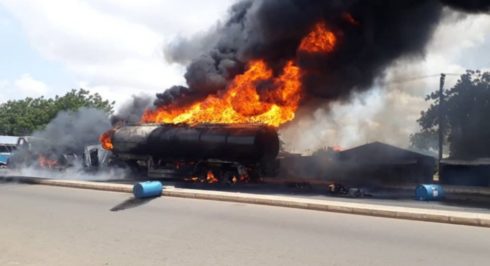On Sunday, a devastating fuel tanker crash in the Agaie area of north-central Niger State, Nigeria, resulted in the deaths of 48 individuals. The tanker, which was also transporting cattle, collided under circumstances that led to the vehicle catching fire. Abdullahi Baba-Arab, the Director-General of the Niger State Emergency Management Agency (NSEMA), reported that at least 50 cattle were burned alive in the accident. Initially, rescue teams recovered 30 bodies, but this number increased by 18 as search-and-rescue operations continued, revealing additional victims who had perished in the fire. In response to the disaster, the deceased were given a mass burial.
Search-and-Rescue Efforts and Government Response in Niger State Fire Disaster
Following the tragic incident, search-and-rescue operations were promptly initiated to manage the aftermath and assist survivors. Despite these efforts, the full extent of injuries and damage remains unclear, highlighting the challenges faced during such emergencies. Governor Mohammed Bago of Niger State urged residents to stay calm and exercise caution on the roads. He emphasized the importance of adhering to road traffic regulations to prevent future tragedies. The crash underscores Nigeria’s ongoing struggles with road safety and infrastructure issues.
Emergency Response and Casualties
According to Abdullahi Baba-arah, Director-General of NSEMA, the response teams faced significant challenges due to the scale of the disaster. Emergency services have been working tirelessly to manage the situation and provide necessary aid at the fire disaster in Niger State. A mass burial was held for 52 victims on Sunday, reflecting the scale of the tragedy. In addition to the fatalities, eight individuals are currently receiving medical treatment for injuries sustained in the accident.
Hussain Ibrahim, an emergency spokesman in Niger State, described the crash as the worst accident in recent years. The Niger state government has committed to covering the hospital expenses for the injured. Governor Umaru Bago of Niger State expressed deep sorrow over the incident, offering condolences to the victims’ families and vowing support for those affected.
Context and Future Prevention
Fuel tanker accidents are a frequent occurrence in Nigeria, largely attributed to the deteriorating condition of the country’s roads and poor vehicle maintenance. The Nigeria Statistics Office reported 2,662 accidents in the first quarter of 2024, highlighting a significant issue with road safety.
The tragic event underscores the urgent need for improved road infrastructure and stricter vehicle regulations to prevent future disasters. Both local and national authorities are being called upon to address these critical issues to enhance public safety and reduce the occurrence of such catastrophic incidents.
Ongoing Challenges and the Need for Infrastructure Improvement
Nigeria’s road safety crisis is exacerbated by the country’s underdeveloped railway network, which contributes to the frequent and often fatal truck accidents. The absence of a robust alternative transport system places an additional burden on road safety efforts, making it imperative for the government to address infrastructure deficiencies.
In light of the recent tragedy, there is a growing call for increased investment in transportation infrastructure and stricter enforcement of safety regulations. Enhancing the efficiency of the railway system could significantly reduce the volume of hazardous cargo transported by road, thereby decreasing the likelihood of similar incidents. As Nigeria grapples with these challenges, the need for comprehensive solutions to improve road safety and prevent future disasters remains a pressing priority.
The Broader Context of Road Safety in Nigeria
Nigeria, Africa’s most populous country with over 220 million residents, faces significant challenges related to road safety. The lack of an efficient railway system for cargo transport has led to an increased reliance on road transport, resulting in frequent and often fatal accidents. Experts attribute the high incidence of truck accidents to factors such as reckless driving, poor road conditions, and poorly maintained vehicles. In 2020 alone, Nigeria recorded 1,531 petrol tanker crashes, leading to 535 fatalities and 1,142 injuries, according to the Federal Road Safety Corps. Compounding the problem, recent increases in petrol prices by the Nigerian National Petroleum Company (NNPC) Ltd have exacerbated fuel shortages, further straining the already fragile transportation infrastructure
Table of Contents
Discover more from OGM News NG
Subscribe to get the latest posts sent to your email.














